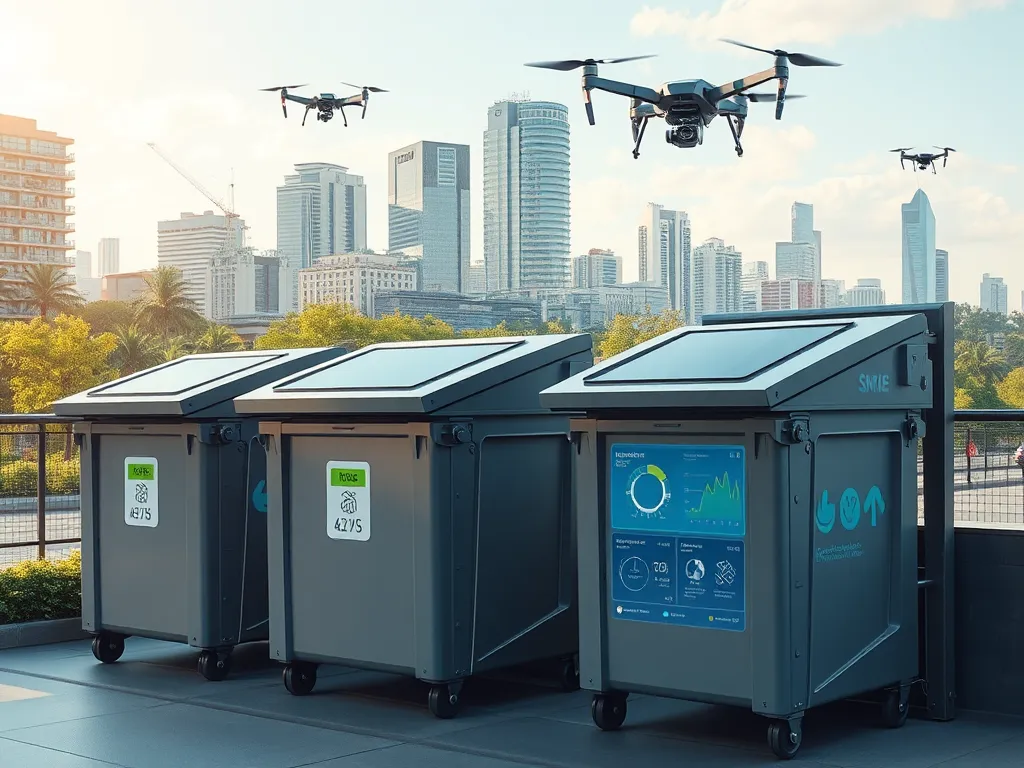Explore Innovations in Dumpster Rental and Waste Removal Tech

Innovations in Dumpster Rental and Waste Removal Technology
In recent years, the dumpster rental and waste removal industry has experienced significant innovations and advancements, leading to improved efficiency, sustainability, and customer satisfaction. Innovations in dumpster rental and waste removal technology have revolutionized how waste is collected, processed, and managed, transforming an often overlooked service into a sophisticated operation that incorporates modern technology and eco-friendly practices. From smart dumpsters equipped with the Internet of Things (IoT) sensors to automated collection vehicles, the industry is embracing new technologies to enhance waste removal services.
One of the most notable innovations in dumpster rental and waste removal technology is the implementation of smart dumpster technology. Smart dumpsters are equipped with sensors that monitor fill levels, allowing waste management companies to optimize their collection routes by only servicing containers that are full or nearly full. This feature not only maximizes efficiency but also reduces unnecessary trips, ultimately lowering operational costs and carbon emissions. Additionally, GPS tracking systems in these smart dumpsters provide real-time data on their location, helping companies manage their fleet more effectively and ensuring timely waste collection services for their customers.
Mobile applications have also emerged as a game-changer in the dumpster rental and waste removal sector. These apps enable customers to schedule pickups, make payments, and track the status of their waste collection in real-time, all from their smartphones. This convenience has significantly enhanced the customer experience, making it easier than ever to manage waste removal. Furthermore, these innovations in dumpster rental and waste removal technology have fostered greater communication between service providers and customers, allowing for quick responses to any concerns or queries.
Eco-friendly waste solutions represent another key aspect of recent innovations in dumpster rental and waste removal technology. Many waste management companies now prioritize sustainability by implementing recycling initiatives and offering biodegradable waste removal options. With a growing awareness of environmental issues, these companies are striving to reduce the carbon footprint associated with waste management operations. By educating customers on proper waste disposal and increasing recycling rates through accessible options, the industry is embracing a greener approach to waste management.
Moreover, automated waste collection vehicles are transforming how waste is collected. These vehicles are often equipped with robotic arms that facilitate easy dumpster unloading, reducing the strain on workers and improving safety during collection. The introduction of electric vehicles in waste collection further enhances sustainability efforts, as they produce less emissions compared to traditional gas-powered vehicles. Enhanced route optimization software also plays a crucial role by analyzing traffic patterns and overall efficiency, leading to cleaner and more efficient waste collection.
Innovative projects at NC State University showcase the power of student entrepreneurship in addressing sustainability challenges.
Smart Dumpster Technology
One of the standout features of smart dumpster technology is the incorporation of IoT sensors that provide real-time monitoring of fill levels. These sensors send data to waste management operators, allowing them to know exactly when a dumpster is nearing capacity and requires collection. This technology minimizes the chances of overflow, reduces operational costs by optimizing collection schedules, and ensures a cleaner environment for communities.
Additionally, GPS tracking in smart dumpsters enables waste management companies to monitor the location of their containers at any given time. This innovation ensures that dumpsters are positioned optimally for both customers and collection crews. Real-time tracking helps in planning efficient routes, further contributing to cost savings and timely services.
Moreover, mobile apps have emerged as vital tools in streamlining the entire scheduling and payment process. Users can book dumpster rentals, view availability, and make secure payments all through these apps, enhancing the overall customer experience. This innovation provides customers with greater control and flexibility in managing their waste disposal needs, leading to higher customer satisfaction rates in the dumpster rental industry.
Eco-Friendly Waste Solutions
The push for recycling initiatives in dumpster rental has become more pronounced as companies strive to promote sustainable waste disposal practices. Many rental services now offer specialized dumpsters for recyclables, encouraging customers to separate their waste and minimize landfill contributions. This initiative is not only beneficial for the environment but also educates the public about the importance of recycling and responsible waste management.
Furthermore, biodegradable waste removal options are becoming more widespread in the industry, catering to environmentally conscious consumers. By providing containers specifically designed for organic waste, companies can ensure that compostable materials are properly processed, ultimately supporting sustainable waste practices and reducing the overall volume of waste sent to landfills.
Through these eco-friendly waste solutions, the industry collectively works to lower its carbon footprint. Innovative practices, such as using renewable energy sources in operations and promoting circular economy principles, indicate a significant shift towards sustainability that aligns with global environmental goals.
Automated Waste Collection Vehicles
Automated waste collection vehicles are emerging as important advancements in waste management technology. These vehicles often feature robotic arms that are capable of efficiently lifting and emptying dumpsters without requiring manual labor. This innovation enhances the safety of workers by reducing the physical demands of waste collection and lowering the risk of injury during routine operations.
The introduction of electric vehicles into waste collection fleets is another vital innovation, contributing significantly to the reduction of greenhouse gas emissions. These eco-friendly vehicles operate quietly and efficiently, making them a suitable choice for urban areas where noise pollution is a concern. Electric waste collection vehicles are becoming increasingly popular as cities and companies aim to enhance their sustainability efforts.
Additionally, route optimization software plays a critical role in maximizing the efficiency of automated waste collection vehicles. This technology assesses traffic conditions and evaluates the best routes for collection, minimizing fuel consumption and improving overall service efficiency. This leads to reduced operational costs and a more environmentally friendly approach to waste management.
Customer Experience Enhancements
The advancements in dumpster rental and waste removal technology have significantly improved customer experience. One major enhancement is the implementation of online booking systems that provide customers with the convenience of scheduling dumpster rentals and pickups at their fingertips. Users can quickly check availability, choose the appropriate dumpster size, and complete the rental process, making it easy to manage their waste disposal needs.
Moreover, transparent pricing models have been introduced to allow customers to understand the costs involved in dumpster rental. This transparency builds trust between service providers and customers, enabling clients to make informed decisions. Tracking systems that allow customers to monitor their waste collection process in real-time further enhance the user experience, providing clarity and assurance that their waste is being handled responsibly.
Incorporating feedback mechanisms has also become a vital component for service improvement. Many waste management companies are now actively seeking feedback from customers post-service, allowing them to adapt and refine their practices. By listening to customer experiences, companies can consistently deliver high-quality service and respond to any emerging needs, ensuring customer satisfaction in an evolving market.
Data Analytics in Waste Management
Data analytics stands at the forefront of innovations in dumpster rental and waste removal technology, allowing companies to harness the power of information to enhance services. Predictive analytics is used to forecast demand and optimize collection schedules, ensuring that resources are allocated efficiently and that customers receive timely services. This proactive approach minimizes waste and optimizes routes, resulting in both cost and time savings for waste management operators.
Usage statistics collected through various technologies enable waste management companies to analyze service patterns and identify areas for improvement. By understanding how customers utilize their services and flow of waste, companies can fine-tune their offerings, ensuring they meet customer expectations and are responsive to market demands.
Finally, performance metrics allow service providers to measure their efficiency and effectiveness. These analytics play a significant role in decision-making, enabling waste management companies to maintain high standards and stay competitive within an evolving industry landscape. Overall, the integration of data analytics in waste management presents exciting opportunities for continuous improvement, driving the sector toward greater innovation and operational excellence.
